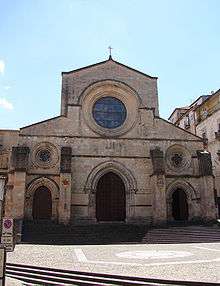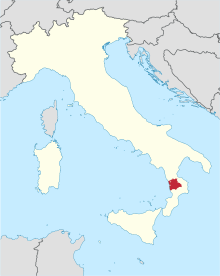Roman Catholic Archdiocese of Cosenza-Bisignano
| Archdiocese of Cosenza-Bisignano Archidioecesis Cosentinus-Bisinianensis | |
|---|---|
 Cathedral of Cosenza | |
| Location | |
| Country | Italy |
| Ecclesiastical province | Cosenza-Bisignano |
| Statistics | |
| Area | 979 sq mi (2,540 km2) |
| Population - Total - Catholics |
(as of 2006) 383,000 381,000 (99.5%) |
| Parishes | 127 |
| Information | |
| Denomination | Roman Catholic |
| Rite | Latin Rite |
| Established | 7th Century |
| Cathedral | Cattedrale di S. Maria Assunta (Cosenza) |
| Co-cathedral | Concattedrale di S. Maria Assunta (Bisignano) |
| Patron saint |
Madonna del Pilerio Francesco di Paola Beato Umile da Bisignano |
| Secular priests | 163 |
| Current leadership | |
| Pope | Francis |
| Archbishop | Salvatore Nunnari |
| Suffragans |
sees: Cassano all’Jonio Archdiocese of Rossano-Cariati San Marco Argentano-Scalea |
| Emeritus Bishops | Giuseppe Agostino |
| Map | |
 | |
| Website | |
| diocesicosenza.it | |
The Italian Catholic archdiocese of Cosenza-Bisignano in Calabria has been a metropolitan see since 2001.[1][2]
History
The Gospel was first preached in Cosenza by missionaries from Reggio; its earliest known bishop is Palumbus, a correspondent (599) of St. Gregory the Great.[3] Cosenza was erected as a diocese in 700.[4] Cosenza was raised to the dignity of an archbishopric about 1050. Among the best known Archbishops of Cosenza have been: Ruffo, who perished in the earthquake of 1184; the Cistercian Martino (1285), a prolific but uncritical writer; Pirro Caracciolo (1452), the friend of St. Francis of Paula; Bartolommeo Fleury, who died at Rome (1495) in Castle Sant' Angelo, where he had been imprisoned for forgery of pontifical documents; Taddeo, later Cardinal, Gaddi (1535), who obtained from Paul IV the privilege by which the cathedral canons of Cosenza wear the choir habit of the Vatican basilica; and Giuseppe Maria Sanfelice (1650), frequently charged by the Holy See with diplomatic missions.[3]
In 1908, The diocese has a population of 159,500, with 109 parishes, 264 churches and chapels, 200 secular and 16 regular priests, 2 religious houses of men and 5 of women.[3]
On April 4, 1979, the Archdiocese was united with the Diocese of San Marco e Bisignano as Cosenza e Bisignano retaining the former Diocese of Bisignano[5] with remainder renamed as the Diocese of San Marco Argentano-Scalea.[6] On September 30, 1986, the Archdiocese was renamed to Cosenza-Bisignano and was elevated to a Metropolitan See on January 30, 2001.[5]
Minor Basilicas
- Basilica della Catena, Laurignano, Cosenza, Calabria
- Basilica of St. Francis of Paola, Paola, Cosenza, Calabria
- Sanctuary-Basilica of the Blessed Angelo of Acri, Cosenza, Cosenza, Calabria[4]
Ordinaries
Diocese of Cosenza
Erected: 7th Century
Latin Name: Cosentinus
Archdiocese of Cosenza
Elevated: 1150
Latin Name: Cosentinus
Immediately Subject to the Holy See
- Niccolò Brancaccio (13 Jan 1377 - 1379 Resigned)
- Giovanni d'Aragona (cardinal) (14 Nov 1481 - 17 Oct 1485 Died)
- Carlo Domenico del Carretto (24 Apr 1489 - 10 Oct 1491 Appointed, Administrator of Angers)
- Battista Pinelli (10 Oct 1491 - 1495 Died)
- Bartolomeo Flores (5 Aug 1495 - 1497 Resigned)
- Ludovico Agnelli (16 Oct 1497 - 3 Nov 1499 Died)
- Francisco de Borja (6 Nov 1499 - 4 Nov 1511 Died)
- Giovanni Ruffo de Theodoli (6 Nov 1511 - 1527 Died)
- Niccolò Gaddi (31 Jan 1528 - 21 Jun 1535 Resigned)
- Taddeo Gaddi (cardinal) (21 Jun 1535 - 22 Dec 1561 Died)
- Francesco Gonzaga (2 Mar 1562 - 12 Jan 1565 Resigned)
- Francesco Milesio (12 Jan 1565 - 10 Jan 1568 Died)
- Flavio Orsini (24 Jan 1569 - 16 Sep 1573 Resigned)
- Andrea Matteo Acquaviva d'Aragona (16 Sep 1573 - 1576 Died)[7]
- Fantino Petrignani (6 Jan 1577 - 1585 Resigned)
- Silvio Passerini (20 May 1585 - 1587 Died)
- Giovanni Evangelista Pallotta (11 Sep 1587 - 5 Apr 1591 Resigned)
- Giovanni Battista Costanzo (5 Apr 1591 - 1617 Died)[8]
- Paolo Emilio Santori (Santorio) (3 Jul 1617 - 20 Nov 1623 Appointed, Archbishop of Urbino)
- Giulio Antonio Santoro (29 Jan 1624 - 28 Sep 1638 Died)[9]
- Martino Alfieri (11 Apr 1639 - 1641 Died)
- Antonio Ricciulli (27 Nov 1641 - May 1643 Died)
- Alfonso Maurelli (Castiglion Morelli) (31 Aug 1643 - 22 Feb 1649 Died)
- Giuseppe Sanfelice (22 Aug 1650 - 20 Nov 1660 Died)
- Gennaro Sanfelice (21 Nov 1661 - 19 Feb 1694 Died)[10]
- Eligio Caracciolo, C.R. (15 Mar 1694 - 17 Oct 1700 Died)
- Andrea Brancaccio, C.R. (18 Apr 1701 - 4 Jun 1725 Died)[11]
- Vincenzo Maria d'Aragona, O.P. (23 Jul 1725 - 18 Apr 1743 Died)
- Francesco Antonio Cavalcanti, C.R. (20 May 1743 - 7 Jan 1748 Died)
- Michele Maria Capece Galeota, C.R. (6 May 1748 - 20 Aug 1764 Appointed, Archbishop of Capua)
- Antonio D'Afflitto, C.R. (20 Aug 1764 - 26 Oct 1772 Died)
- Gennaro Clemente Francone (14 Dec 1772 - 27 Feb 1792 Confirmed, Archbishop (Personal Title) of Gaeta)
- Raffaele Mormile, C.R. (27 Feb 1792 Confirmed - 28 Mar 1803 Appointed, Archbishop of Palermo)
- Vincenzo Nicola Pasquale Dentice, O.S.B. (26 Jun 1805 Confirmed - 1 Nov 1806 Died)
- Domenico Narni Mancinelli (6 Apr 1818 Confirmed - 24 Feb 1832 Confirmed, Archbishop (Personal Title) of Caserta)
- Lorenzo Pontillo (20 Jan 1834 Confirmed - 10 Nov 1873 Died)
- Camillo Sorgente (4 May 1874 - 2 Oct 1911 Died)
- Tommaso Trussoni (14 Dec 1912 - 9 Apr 1934 Retired)
- Roberto Nogara (22 Aug 1934 - 24 Apr 1940 Died)
- Aniello Calcara (1 Jul 1940 - 5 Jul 1961 Died)
- Domenico Picchinenna (4 Sep 1961 - 29 May 1971 Appointed, Coadjutor Archbishop of Catania)
- Enea Selis (2 Sep 1971 - 30 Oct 1979 Resigned)
Archdiocese of Cosenza e Bisignano
United: 4 April 1979 with the Diocese of San Marco e Bisignano
Latin Name: Cosentinus et Bisinianensis
- Dino Trabalzini (18 Mar 1980 - 6 Jun 1998 Retired)
Archdiocese of Cosenza-Bisignano
Name Changed: 30 September 1986
Metropolitan See
- Giuseppe Agostino (6 Jun 1998 - 18 Dec 2004 Retired)
- Salvatore Nunnari (18 Dec 2004 - 15 May 2015 Retired)
- Francescantonio Nolè, O.F.M. Conv. (15 May 2015 - )
References
- ↑ "Archdiocese of Cosenza-Bisignano" Catholic-Hierarchy.org. David M. Cheney. Retrieved February 29, 2016
- ↑ "Metropolitan Archdiocese of Cosenza-Bisignano" GCatholic.org. Gabriel Chow. Retrieved February 29, 2016
- 1 2 3
 Herbermann, Charles, ed. (1913). "Cosenza". Catholic Encyclopedia. New York: Robert Appleton Company.
Herbermann, Charles, ed. (1913). "Cosenza". Catholic Encyclopedia. New York: Robert Appleton Company. - 1 2 "Metropolitan Archdiocese of Cosenza–Bisignano". Catholic Dioceses in the World. GCatholic. Retrieved 5 January 2012.
- 1 2 Cheney, David M. "Archdiocese of Cosenza-Bisignano". All Dioceses. catholic-hierarchy.org. Retrieved 5 January 2012.
- ↑ "Diocese of San Marco Argentano–Scalea". Catholic Dioceses in the World. GCatholic. Retrieved 5 January 2012.
- ↑ "Archbishop Andrea Matteo Acquaviva d'Aragona" Catholic-Hierarchy.org. David M. Cheney. Retrieved March 21, 2016
- ↑ "Archbishop Giovanni Battista Costanzo" Catholic-Hierarchy.org. David M. Cheney. Retrieved March 21, 2016
- ↑ "Archbishop Giulio Antonio Santoro" Catholic-Hierarchy.org. David M. Cheney. Retrieved November 24, 2016
- ↑ "Archbishop Gennaro Sanfelice" Catholic-Hierarchy.org. David M. Cheney. Retrieved July 13, 2016
- ↑ "Bishop Nicola Cirillo" Catholic-Hierarchy.org. David M. Cheney. Retrieved August 21, 2016
External links
![]() This article incorporates text from a publication now in the public domain: Herbermann, Charles, ed. (1913). "article name needed". Catholic Encyclopedia. New York: Robert Appleton.
This article incorporates text from a publication now in the public domain: Herbermann, Charles, ed. (1913). "article name needed". Catholic Encyclopedia. New York: Robert Appleton.
Coordinates: 39°18′00″N 16°15′00″E / 39.3000°N 16.2500°E